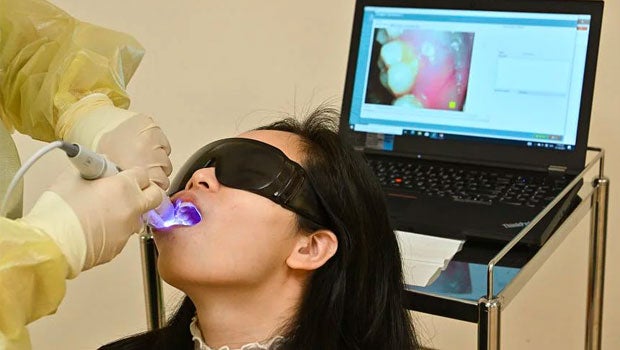
National Dental Centre Singapore research executive Lim Xin Yi having her teeth examined during a demonstration of the pilot tele-dentistry programme. ST PHOTO: LIM YAOHUI
SINGAPORE - Seniors who have mobility issues or are housebound will have access to dental healthcare through a programme where a dentist visits them at the nursing home or at their own homes once, and nurses drop by for regular check-ups.
The Tele-Dentistry Oral Care for Seniors (T-Docs) programme, which was piloted in early 2021, is in addition to other health check-ups the seniors receive.
The joint initiative by the National Dental Centre Singapore (NDCS) and Temasek Foundation leverages technology to provide regular screening and monitoring of seniors’ oral health, which they said enables early detection of oral diseases and ensures preventive care for seniors.
Clinical Associate Professor Christina Sim, principal investigator at T-Docs, said: “This enables early detection of oral diseases and fills the crucial gap in preventive oral care for our vulnerable seniors, of which dental issues were found among 80 per cent of about 200 seniors recruited for the pilot T-Docs programme.”
The dental issues include tooth decay and periodontal disease, which refers to gum infections.
A 2017 study found that 31 per cent of seniors in Singapore were found to be edentulous or using dentures, and 38 per cent had fewer than 20 natural teeth.
Professor Sim, who is a senior consultant at the NDCS, added:. “This new model of care provides timely oral care to seniors, convenience to caregivers and our partners, and optimises resources for better community care.”
More than 40 nurses in nursing homes here and members of St. Andrew’s Community Hospital (SACH) homecare team have been trained to perform oral health screenings with intra-oral imaging of seniors’ oral cavities and provide basic oral and denture hygiene care.
Seniors are first examined by a dentist. They are then regularly screened and monitored every six months by trained staff from SACH and Vanguard Healthcare, which operates eldercare facilities, using an intra-oral camera with fluorescence technology.
Early signs of tooth decay and gum inflammation can be detected with the use of the intra-oral camera that is placed in the patient’s mouth. The camera is also able to differentiate between existing and newly formed dental plaque.
Following the check-up, the intra-oral scans and medical information are uploaded to an electronic system from which NDCS dentists receive the patients’ records, and recommend treatment plans that will be relayed back to SACH and Vanguard Healthcare staff for follow-up.
Many of the 199 seniors involved in the pilot programme were attended to by nurses and staff who already regularly visit them for health checkups.
Retiree Lim Kwang Chuey had not seen a dentist in more than 10 years due to mobility issues.
The 64-year-old has a homecare team from SACH visit him every six months to conduct a health checkup. When he was included in the T-Docs programme in February 2022, the same team also included an oral health checkup at his home.
Mr Lim said: “Last time, it was a hassle for me to go for dental checkups. Now, I feel very happy that I don’t have to leave my home.”
He added: “I already know the nurse that helps me, so I feel safe and comfortable when she checks my teeth.”
Nurse Sek Mun Yin, a senior staff nurse at SACH, is part of his homecare team.
The 39-year-old said that Mr Lim was very receptive to the programme and decided to participate without any hesitation. She added that he did not usually go for dental checkups because he never felt any discomfort.

Early signs of tooth decay and gum inflammation can be detected with the use of the intra-oral camera that is placed in the patient’s mouth. ST PHOTO: LIM YAOHUI
The T-Docs programme also helps ease the burden on caregivers.
Retired taxi driver Richard Lim is the main caregiver of his 89-year-old mother, who is housebound and has lost her ability to perform all daily acitivities.
The 66-year-old said his mother was included in the programme in January 2022.
“Visiting the dentist was a challenge for us because my mother is housebound. This programme relieves a lot of the burden on my part as well,” he said.
Mr Lim is now also able to better help his mother with her oral hygiene, as the homecare team has taught him how to do proper teeth cleaning.
Professor Sim said she hopes that with the programme, seniors can receive help in their own homes, with nurses and staff that they are comfortable with.
“I felt very sad when I saw the lack of care for dental health of seniors. Oral care is important to their general well-being, and we need to make sure oral care is accessible to them,” Professor Sim added.
NDCS is looking to expand the T-Docs programme, which will run for another two years, to reach more than 500 seniors such as those in day care centres, senior activity centres, special needs centres and prison.
The Straits Times © Singapore Press Holdings Limited. Permission required for
reproduction.













 Get it on Google Play
Get it on Google Play